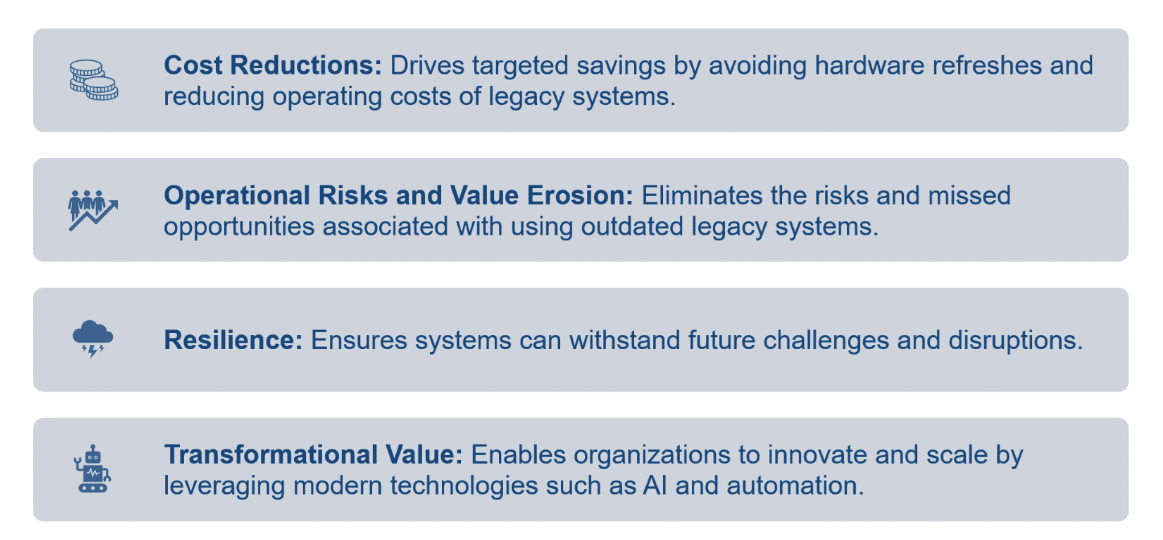It is no longer feasible for hospitals and health systems to stay competitive using outdated legacy ERP systems. Current industry pressures have made the need for efficiency, automation, and ERP-EHR integration too critical. Further, the functionality available in modern cloud-based ERP solutions has all but rendered legacy systems obsolete.
While the initial capital outlay required for a modern ERP may seem significant in the near term, any upfront costs associated with migration pale compared to the price of doing nothing. The ability to withstand inevitable future industry challenges, embrace innovation, drive automation and operational efficiency, and minimize rapidly evolving information security threats are basic requirements for conducting business and caring for patients in healthcare delivery.
The Business Case for ERP Modernization
Moving to a next-generation, cloud-based ERP system will future-proof your organization for the long term, yield new levels of strategic agility, and encourage continuous innovation, enabling you to navigate and pivot more quickly. However, the business case for migrating off your legacy ERP goes beyond just the well-documented benefits of modern solutions. It is also crucial to consider the significant – and growing – risks posed by outdated legacy systems.
Legacy ERP systems – some used for decades – represent a massive information security and business risk. In most cases, the older the legacy system, the greater the risk. Legacy systems are more vulnerable to ransomware attacks and breaches than their modern cloud-based counterparts – and represent a much more appealing target for cybercriminals. From a business perspective, outdated legacy ERP systems are not resilient enough to withstand future challenges and industry disruptions. They drive too many inefficiencies and require too many manual processes compared to modern cloud-based ERP solutions. Additionally, the level of integration between legacy ERPs and EHRs (and other clinical applications that impact patient care) is limited, and the ability of legacy ERPs to leverage advances in artificial intelligence (AI) and machine learning (ML) is lacking.

The Long-Term Cost of Delay Far Exceeds the Near Term-Cost of Migration
The upfront capital required for a modern cloud-based ERP solution can be significant. However, focusing too narrowly on that initial capital outlay risks losing sight of the broader picture because the long-term costs of doing nothing far exceed the near-term capital costs associated with migrating to a new ERP solution.
Legacy ERPs can no longer effectively support the rapidly evolving business and clinical needs of hospitals and health systems, so it isn’t a question of if your organization has to adopt a modern cloud-based ERP solution but rather how quickly you can do so. With every passing month, the costs of delay continue to accrue. In markets where the competition has already adopted modern cloud-based ERP solutions – and are starting to realize tangible benefits – the cost of delay is even more substantial.
The price of delay goes far beyond the continued operating and maintenance costs of a legacy system that has essentially been rendered obsolete. There is also the lost opportunity to future-proof your organization for the challenges and disruptions that lie ahead.
For example, doing nothing will severely affect employee retention and recruitment. Good employees expect good tools so they can perform their best. Baseline expectations are rooted in the cutting-edge technologies they use daily in their personal lives. Having to deal with inefficient workarounds and manual processes in the workplace will cause frustration and could ultimately cost you some of your best people. Staying on an outdated legacy ERP system will also make it significantly more difficult to recruit better staff moving forward.
Doing nothing also limits the power of effective data. A single, fully integrated ERP solution is crucial for AI because it provides a centralized and unified data source to train models effectively. More accurate predictions and better decision-making capabilities are possible when AI tools can analyze patterns and trends across the entire business operation.
How to Minimize the Cost of Delays
Keys to success for hospitals or health systems still using outdated legacy ERP systems:
- Have a well-defined plan for migrating to a modern ERP solution within the next few years. It is essential to take time to ensure your organization will be as well-positioned as possible for a successful migration. Deciding on the right cloud-based ERP vendor, securing stakeholder engagement across your organization, and finding the right implementation partner are not decisions that should be rushed. They are, however, decisions that should be planned for and budgeted. Waiting a year or two while your organization focuses on the necessary steps to prepare for a new ERP solution is fundamentally different than doing nothing and failing to make any progress towards an investment that is all but inevitable.
- Factor in the many types of potential cost savings. Don’t let the initial capital costs of a modern ERP solution cause you to lose sight of the significant and different kinds of possible savings. It is more than eliminating your legacy system’s steadily accruing operating and maintenance expenses. The opportunity costs associated with delaying your migration to a new ERP solution are also critical to account for, such as those in the table below.

- Be realistic about ROI. The benefits of modern cloud-based ERP solutions are well documented. However, the ROI may not necessarily accrue as quickly as some of your key internal stakeholders expect – or as quickly as some ERP vendors promise. The time to realize potential ROI will vary from organization to organization, depending on factors such as the current processes in place and the level of automation. Even if your hospital or health system isn’t seeing the “immediate” results you expected, the benefit of not falling further behind cannot be ignored. For example, if you are already spending 5% more on supply chain costs than your competitor, delaying a move from your legacy ERP system will only cause that gap to grow – especially if your competitor has gained familiarity with a modern ERP solution and is steadily accruing savings. The same is true when it comes to the consequences of not having a modern application to support your workforce acquisition, development, and overall user experience.
The Bottom Line
Hospitals and health systems cannot afford to wait to migrate off outdated legacy ERP systems. Doing nothing is not a strategy. Doing nothing means spending valuable resources and funding on a legacy system that can no longer meet your organization’s needs. Doing nothing means another year of dealing with inefficiencies and manual processes that cost your hospital or health system unnecessary money and frustrate your employees – all while your competition gets further ahead. Doing nothing means waiting even longer to capitalize on the benefits of true ERP-EHR integration – and watching from the sidelines as other hospitals and health systems in your region embrace innovation with AI.
It is important to take time to make the right decision for your organization. There needs to be a well-defined plan that enables you to migrate within the next year or two, an enterprise-wide understanding of the full scope of benefits possible from a modern ERP solution, and realistic expectations about achieving the expected ROI.
About Impact Advisors
As the only ERP consultancy focused exclusively on healthcare, Impact Advisors knows what hospitals and health systems need from their ERP ecosystem. We’ve collaborated with over 40 client organizations to deliver more value from their ERP solutions by addressing key business and operational challenges.
Impact Advisors brings proven healthcare-centric methodologies that complement those of the market’s top ERP solutions and vendors, including Oracle and Workday. In addition to certified and highly skilled practitioners, we offer business transformation expertise, 16 years of large-scale implementation success, and a value-driven cost structure to guarantee achievement of your ERP goals and propel your organization forward.



